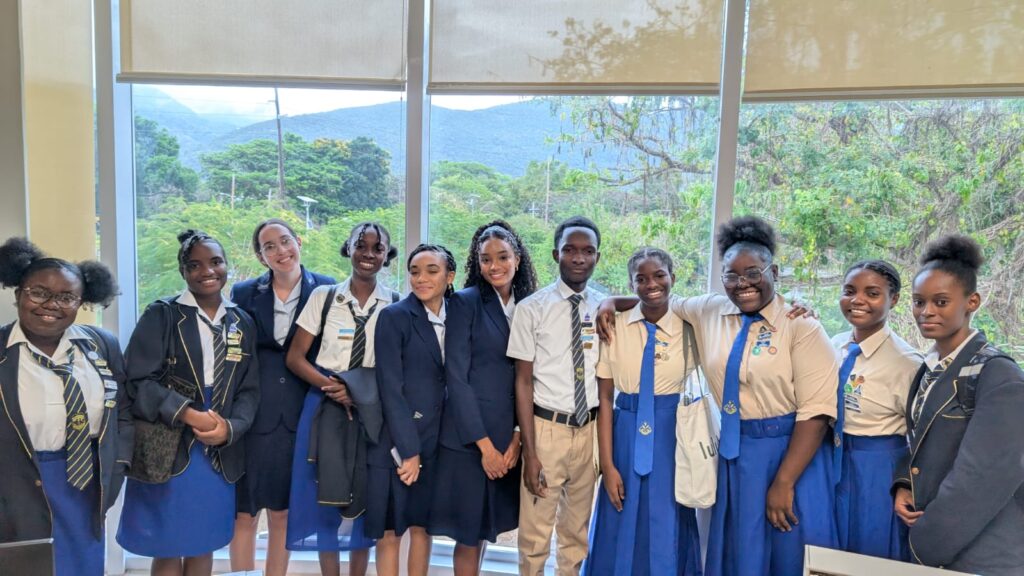Vibrant steel drums and guitars fill the studio, embodying the spirit of Jamaican reggae music. (Adobe stock image)
The recent death of veteran roots reggae star Max Romeo has underlined the crisis of identity and continuity that haunts reggae. Who will carry the mantle going forward, industry insiders are asking.
The situation paints a daunting picture.
Over the past two decades, the deaths of standard bearers like Robbie Shakespeare, Joseph ‘Culture’ Hill, Gregory Isaacs, John Holt, Lee Scratch Perry, Albert Griffiths of the Gladiators, Toots Hibbert, Tabby and Bunny of the Mighty Diamonds, Peetah Morgan, and Cocoa Tea, have left a huge void in the live reggae circuit.
The situation is further compounded by the fact that other stalwarts such as Big Youth (76), Ivorian singer Alpha Blonde (72), British-based dub poet Linton Kwesi Johnson (72), and Burning Spear (80) are on the verge of retirement.
Freddie McGregor, who is 68, suffered a stroke that has affected his ability to tour. The global icon, 80-year-old Jimmy Cliff is not touring as well. Tour gurus like Copeland Forbes are not as active anymore. Ska star Derrick Morgan is an octogenarian and is not as active. Ken Boothe, a big puller in the UK market, is visually impaired and also not very active.
“The question we have to ask is: Are we creating the sounds that will stand out in years to come? Who will be the new headliners? And can they fill up venues,” booking agent Cabel Stephenson told Observer Online.
It’s a sobering realization that it may just be the end of an era.
“The reggae producers Lee Scratch Perry and Striker Lee have passed on, but where are the new great reggae creatives. We need new music and new products to penetrate the marketplace,” Stephenson added.
Still, there are positive signs.
“The third generation of the Marleys is continuing the tradition, the Marley sound is still alive. The burden of touring is now on the shoulders of artistes like Capleton, Buju Banton and Protoje,” Stephenson said.
But what of the new reggae stars who are under the age of 35?
Renowned Barcelona-based reggae promoter Julian Mancebo believes that the new wave of next gen reggae stars has failed to properly manifest.
Mancebo theorises that the self-imposed absence of emerging reggae stars like Chronixx and Koffee on the live music scene for the past two years has stalled the so-called ‘reggae revival’ movement – which emerged in the mid-2010s with the rise of Chronixx, Protoje and others – and by extension, stymied reggae’s future.
He was heavily critical of Koffee in particular, pointing to a lack of spirituality and consciousness in her musical output.
“For me, the ‘reggae revival’ is fake, there was only a group of artistes, most of them uptown people and without an extremely humble origin, who took advantage of an empty space to promote a new musical style, as in the case of Koffee, which was nourished by the genre but based on pop to get closer to the big markets and reach a quick but ephemeral success,” Mancebo said.
Koffee’s career has floundered over the past 18 months. She released 2019’s Grammy-winning Rapture EP which spawned her breakthrough hit, Toast, which earned over 50 million on-demand streams in the US, and then 2022’s full-length project Gifted under the Promised Land Records imprint. But then she encountered strong headwinds peculiar to reggae stars such as lack of streaming data from a core fan base in Jamaica and restricted radio play opportunities in the American industry.
Mancebo feels betrayed by the new reggae frontrunners who created a movement which he believes has failed to win over US or European audiences while simultaneously managing to alienate the roots reggae fanbase in Europe.
READ: Is reggae music ‘almost dead’ in Europe?
“This so-called movement, lacking the necessary spirituality and consciousness, did not follow in the wake of the greats like Luciano, Anthony B, Lutan Fyah or Cocoa Tea, who kept producing material continuously and touring around Europe and the USA non-stop,” Mancebo mused. “They were dedicated to experimenting with new styles different from roots reggae, but using their Jamaican origin and nationality to try to penetrate European audiences.”
Mancebo added that Chronixx’s absence on the live music scene has further doomed the appeal of reggae among the European audiences.
“Chronixx, as well as others like Buju or Beres, achieved great success, but they forgot that touring and performing at local venues was essential for the maintenance of the genre among the European public, instead, they raised their prices exorbitantly so that only a minimum number of festivals and not always reggae festivals, could count on their presence,” Mancebo observed.
Interestingly, Chronixx will be one of the headliners for the fifth staging of Reggae Land Festival in August, an appearance that will bring the Smile Jamaica artiste’s long hiatus from the music scene to an end. That show will be held on August 3 at the Milton Keynes National Bowl in the UK.
Last June, Chronixx attributed his absence from the music scene to a lack of creativity. At the time, he shared on Instagram that he was not negotiating any shows at the moment but said although he missed his fans and the vibe, he couldn’t rush creativity.
Last year, the Sierra Nevada World Music festival in California was canceled “due to extreme financial challenges,” the Medocino Voice reported, while the Reggae Lovefest, scheduled for June 22 in 2024, was postponed and never returned.
The Overjam Festival in Slovenia and the Sundance Festival were also put off in 2024 and have not returned. The popular Garance Festival in France was last held in 2012. The live reggae music industry has been contracting.
“What we need to do as a culture and as a people from Jamaica, a small island with so much influence, is to protect the platforms we have now. We need to approach event planners and investors to find out what is happening. Ask: how do we help to preserve and keep the remaining surviving platforms for our music?” Stephenson suggested.
“We have to curate artistes and entertainment managers to be punctual, reasonable, business-like and corporate-leaning in their attitudes to negotiate deals. A lot of festivals are still being held now and there are no Jamaican acts on these festivals, we need to change that and find a way to export our talent overseas in large numbers again.”
Stephenson believes that reggae can be saved.
“There is hope again, that is why this Roots and Culture 3 tour was so important in re-establishing the base, returning the industry to the basics,” he said.
“The talent buyers at the major festivals noted how well the tour did, every night we had packed venues, 500 in Berlin, 400 plus in Geneva, 300 in a small club in Marseille on a Wednesday. A lot of these shows are not weekend shows and the promoters were happy, they made money,” Stephenson said.
Stephenson said we need additional sounds in the marketplace to create diversity in the diaspora in the UK and Europe.
“We need Glen Washington, Beres Hammond to go into the marketplace. We need to package our best acts and provide real entertainment value.
“We just need more hit songs, we need more stars,” Stephenson said.










